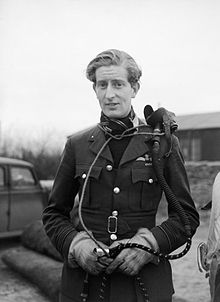Hugh Dundas
| Sir Hugh Dundas | |
|---|---|

Dundas at RAF Duxford, Cambridgeshire, 2 January 1942
|
|
| Birth name | Hugh Spencer Lisle Dundas |
| Nickname(s) | Cocky |
| Born |
22 July 1920 Doncaster, England |
| Died | 10 July 1995 (aged 74) |
| Allegiance |
|
| Service/branch |
|
| Years of service | 1938–1947 |
| Rank | Group Captain |
| Commands held | No. 56 Squadron RAF |
| Battles/wars | World War II |
| Awards |
Commander of the Order of the British Empire Distinguished Service Order Distinguished Flying Cross |
| Relations | John Dundas (brother) |
| Other work | Company director |
Sir Hugh Spencer Lisle Dundas, CBE, DSO & Bar, DFC (22 July 1920 – 10 July 1995), nicknamed "Cocky", was a World War II fighter pilot in the Royal Air Force and later a senior broadcasting executive. He was promoted to squadron leader at the age of 21, to wing commander at 22. In 1944, Dundas was awarded the Distinguished Service Order and at 24 became one of the youngest group captains in the RAF. He was awarded the Distinguished Flying Cross in 1941, the Distinguished Service Order in 1944 and a bar to the DSO in 1945.
Born in Doncaster, on 2 July 1920, Dundas was a scion of a noble family. He was the grandson of the Scottish Liberal politician John Dundas and a great great grandson of Lawrence Dundas, 1st Earl of Zetland. Dundas was also related to the Earl of Halifax. Like his elder brother John, he became fascinated by the idea of flying from childhood, and he joined the Auxiliary Air Force straight after leaving Stowe School in 1938. On 23 July 1939, the day after his 19th birthday, he was commissioned an acting pilot officer in the AuxAF. He was confirmed in the rank of pilot officer on 2 October, with the service number 91001.
Dundas was called up early in the war, serving with No. 616 Squadron, flying Spitfires. He was shot down on 22 August and wounded during the Battle of Britain, but returned to his Squadron in September 1940. His brother John, a 12-kill ace with No. 609 Squadron, was killed in action in November 1940 after shooting down Helmut Wick, the top–scoring German ace at the time. Dundas was promoted to flying officer (war-substantive) on 2 October.
...
Wikipedia
